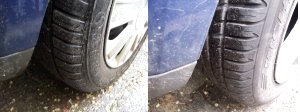With Germany experiencing the coldest winter for 13 years we decided to change our plans for the weekend and took our sledge out instead.
This gave us not only a rare chance to go sledging on the hills of Camp King, but also to talk about some of the things that German residents – and possibly long-term visitors – need to know about: Winter tyres, snow-clearing duty and a lack of salt.

Sledging in Camp King
To find out more, listen to the podcast:
(Press the “play” button to listen to the podcast)



